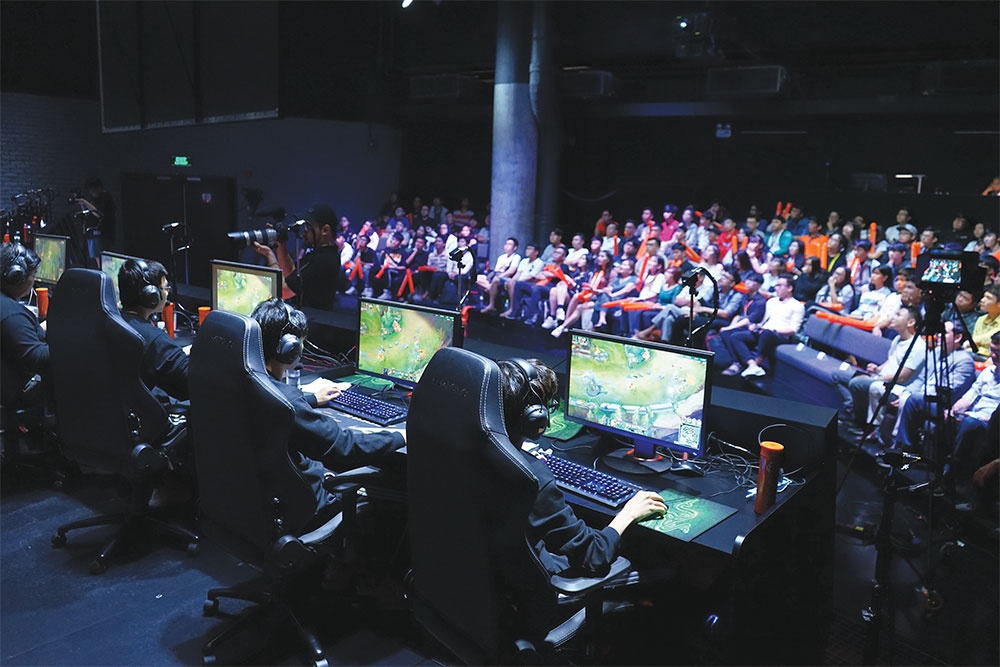INTERNATIONAL INVESTMENT
AND PORTAL
GameVerse 2023, the first major event for the Vietnamese game industry, took place in Ho Chi Minh City in April 1-2, gathering more than 5,000 game developers, publishers, and others. The gaming festival has become an annual event in the US, South Korea, Spain, and Thailand, but Vietnam has been waiting for such an event for many years.
“The event is a recognition of the contribution of the online gaming sector to the economy. I hope game businesses will invest more heavily in production and reduce the number of imported games. Policymakers should also view games more fairly to promote its development,” said La Xuan Thang, director of online game publishing at VNG Games.
 Most Vietnamese-made games are hyper-casual, but they do not necessarily bring in the big bucks, photo Le Toan
Most Vietnamese-made games are hyper-casual, but they do not necessarily bring in the big bucks, photo Le Toan
The game industry possesses plenty of development potential and is expected to become a key field of the digital content industry in Vietnam, with an annual growth rate of over 8 per cent and expecting to have up to 640 million people participating in some way by 2025.
According to statistics from the Ministry of Information and Communications (MIC), 248 businesses were granted G1 video game service business licences and over 850 games were released by the end of 2022.
Figures released by Newzoo last year also showed that Vietnam’s online game revenue is currently ranked fourth in Southeast Asia with $507 million, surpassing Singapore ($288 million).
Factors such as good internet infrastructure, low cost, and a large percentage of the population using smartphones are top catalysts to promote game developers and publishers in Vietnam and support more room for expansion.
In the international market, Vietnamese games have also achieved remarkable status. According to Data.ai, one out of every 25 mobile games downloaded on Apple’s App Store or Google Play comes from a Vietnamese publisher.
“Vietnam is also the leading country in Southeast Asia in terms of developers,” said Le Quang Tu Do, director of the Department of Radio, Television, and Electronic Information under the MIC. “There are more than 180,000 Vietnamese people carrying out programming and writing applications for Google Play and the App Store.”
These advantages are the basis for the MIC’s aim to increase the gaming industry’s revenue from $600 million to $1 billion and promote about 400 new startups in the next five years.
However, the feasibility of the goal depends on improving in various areas. “The biggest difficulty is that many game businesses do not collaborate or take advantage of each other, leading to the fact that Vietnamese people play foreign games while Vietnamese businesses boast many foreign players,” Do said.
According to Thai Thanh Liem, CEO of Topebox, part of the reason for this situation is that Vietnam’s level of game-making has not met the demand and preferences of Vietnamese gamers.
“Vietnamese people have quite a high level of gaming, but most Vietnamese studios are investing in hyper-casual games with simple graphics, plot, and gameplay, funded by manufacturers because they are easy and fast to develop,” said Liem.
However, most of these games operate on the model of making money from advertising instead of collecting money from in-app purchases, frustrating many players. Therefore, during more than 10 years of development, the game industry in Vietnam has not achieved expected results despite owning game products that resonate in the international market such as Flappy Bird, Axie Infinity, and Sky Dancer.
The problem of human resource quality in game development is also a challenge, as there is a disparity between the level of programmers and the requirements of the business.
“Every year, Vietnam needs 150,000 employees in the IT industry, but there is no accurate data on human resource demand in the game sector. The current personnel are mainly trained IT forces but are not specialised in the game industry,” said Nguyen Ngoc Bao, general director of VTC Game.
Brain drain is also quite common, as many foreign game developers offer good deals to attract Vietnamese personnel. However, this also creates a challenge for game developers when they have to choose to produce on-demand games to make money faster or accept outsourcing to foreign firms for better wages and costs.
On the other hand, while markets like South Korea, China, Japan, the United States, and France recognise online games as an important economic sector and are identified as a spearhead for exporting culture to the world, in Vietnam, gaming still has to overcome negative stereotypes which has hindered development.
“Games are still considered entertainment products containing unhealthy or violent content, or they are misleading or negatively affect young people. This discourages development like in other entertainment or digital content creation industries,” said Dao Quang Tuan, deputy general director of Funtap.
 Gaming publishers shy away from tax proposition
Gaming publishers shy away from tax proposition
A proposal to impose special consumption taxes on online games in Vietnam has been shot down by businesses and industry experts.



















